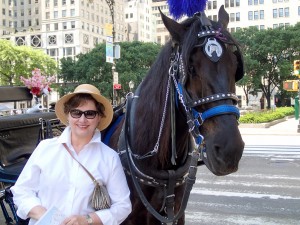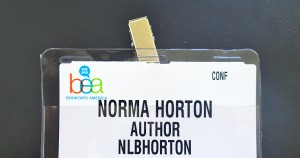Prepping For A Conference/Pre-Publishing Tools
(This is the first in a series about pre-publishing tools.)
Never underestimate the importance of pitching your manuscript to an acquisitions editor face-to-face. If ever there were a deal-breaker, this is it.
My first writers’ conference, the natural place for pitches, netted a full-manuscript request from one of America’s Big Six publishers, and a very fine literary agent who now shops a three-book series to the world. Conferences are expensive and tiring, but excellent places to make contacts you need in publishing. I just returned from BEA (BookExpo America) in NYC, where I met new publishing representatives (the subject of another blog), reconnected with those reviewing my work, and encountered the handsome horse near Central Park.
America’s Big Six publishers, and a very fine literary agent who now shops a three-book series to the world. Conferences are expensive and tiring, but excellent places to make contacts you need in publishing. I just returned from BEA (BookExpo America) in NYC, where I met new publishing representatives (the subject of another blog), reconnected with those reviewing my work, and encountered the handsome horse near Central Park.
Assuming your manuscript is ready to be shopped, these suggestions should help you prepare.
1) Develop a ten-second pitch. I own one watch with a second hand, and I use it to time myself. This pitch needs to be the greatest, most evocative headline you’ve ever written. Mine was, “Would you kill to save your child? Archaeologist Grace Madison did.” This version needs to engage your listener, and trigger immediate questions. Be prepared to give it in an elevator, if necessary. Or in a hotel lobby, or parking garage. Be ready with this one.
2) Develop a two-minute pitch. This is hard. You birthed your manuscript, and know it intimately. Stripping it to its essentials takes time and analysis. I started my two-minute pitch with my 10-second, then moved briskly through beginning, middle, and end. Include an allusion to how the book closes, and don’t leave the agent/editor hanging.
3) Memorize both until they’re second nature.
3) Practice. Then practice more. I stood in front of the bathroom mirror, pitching repeatedly. Use your hands to reinforce your words. (When I used the word, “under,” I acted as if my hands were supporting something.) The visual is as important as the verbal. The more senses you engage, the more invested in listening the agent/editor will be.
4) Dress the part. I always wear an excellent jacket because this IS an important business meeting. The person you’re pitching has to believe you can market your work, wants to be confident you present a professional manner. This isn’t the time to be cute or dress for coffee. It’s a time to look your business best, the way you’d want someone to look if they represented you, as you will the publisher someday. Looks count. (I think that means a well-cut jacket for either sex.)
 5) Take yourself seriously. Don’t giggle. Dial back the bling. (That includes makeup, ladies. Or gentlemen with flair.) Bring the best business cards you can afford. Have at least three people proof your material to ensure it’s free of typos and grammar errors. Be courteous, but formal. Warm, but in control. Professional.
5) Take yourself seriously. Don’t giggle. Dial back the bling. (That includes makeup, ladies. Or gentlemen with flair.) Bring the best business cards you can afford. Have at least three people proof your material to ensure it’s free of typos and grammar errors. Be courteous, but formal. Warm, but in control. Professional.
6) Be aware of your listener. One of the most painful situations I’ve witnessed a man, pitching a rep from a big publishing house, who wouldn’t end his appointment on time. The editor wasn’t interested. Clearly. She finally stood. He remained seated. She looked at her watch. He kept talking. She moved around the table. He started begging. She finally turned to me to ask if I was her next appointment, and apologized for being late. Seriously?
Believe me, you can tell if someone is interested in your work. It’s exhilarating! But save disinterested parties (and yourself) the embarrassment of overstaying your welcome by being aware of body language. A lack of questions means your time is up, regardless of what the clock says.